Looking to bring humor, positivity, and creativity to conversations about autism?
Our list of 200+ funny names for autism focuses on celebrating uniqueness, quirks, and the joyful side of neurodiversity.
With playful, clever, and uplifting names, you can embrace personality and individuality in a way that’s both fun and respectful.
The Benefits of Funny Names for Autism
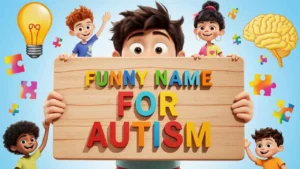
- Celebrates Individuality: Highlights the unique traits and strengths of neurodiverse individuals.
- Builds Positivity: A fun name can bring smiles and reduce stress in daily life.
- Encourages Creativity: Inspires imaginative, playful ways to describe traits and hobbies.
- Fosters Connection: Shared humor can strengthen friendships and understanding.
- Empowers Identity: Emphasizes pride in neurodiversity rather than stigma.
Funny Names for Autism
1. Quirk Meister
Embracing all the delightful quirks that make you unique.
2. Brainy Bubbles
For the thinker whose ideas are always popping up.
3. Sparkle Synapse
Celebrating a mind that lights up with creativity.
4. Focus Fox
For laser-sharp attention when tackling favorite interests.
5. Captain Curious
Always exploring, learning, and asking questions.
6. Wonder Whiz
A playful nod to incredible talents and insights.
7. Giggle Gear
Full of laughter, energy, and fun moments.
8. Thought Tornado
A whirlwind of ideas, passions, and creativity.
9. Happy Hyperdrive
Zooming through life with energy and joy.
10. Sensory Superstar
Celebrating the bright, vivid way the world is experienced.
11. Joyful Jigsaw
Piecing together ideas and fun in unique ways.
12. Pattern Pioneer
Always spotting connections and details others might miss.
13. Mind Maze Master
Navigating thoughts and ideas like a pro.
14. Laughing Lighthouse
Guiding positivity and joy wherever you go.
15. Quirky Quantum
A nod to being wonderfully complex and full of potential.
Read Also:
Medical Names for Autism
1. Autism Spectrum Disorder (ASD)
The official medical term describing a range of neurodevelopmental conditions.
2. Pervasive Developmental Disorder (PDD)
An older classification that included autism and related disorders.
3. Asperger’s Syndrome
Previously used to describe high-functioning autism, now part of ASD.
4. Childhood Disintegrative Disorder
A rare condition where children develop typically and then lose skills.
5. Rett Syndrome
A genetic disorder affecting brain development, mostly in girls, sometimes linked with autism-like symptoms.
6. Kanner’s Autism
Named after Leo Kanner, who first described classic autism in 1943.
7. Neurodevelopmental Disorder
A broad category including ASD, ADHD, and other brain-based developmental conditions.
8. High-Functioning Autism
Describes individuals with autism who have average or above-average intelligence.
9. Low-Functioning Autism
Describes individuals with significant support needs due to autism.
10. Social Communication Disorder
A condition affecting social interaction and communication, sometimes overlapping with ASD.
11. Rett-Like Autism
Cases that show some Rett syndrome traits but primarily align with ASD.
12. PDD-NOS (Pervasive Developmental Disorder – Not Otherwise Specified)
An older term for cases on the autism spectrum that didn’t fit other categories.
13. Neurodivergent Condition
A broad term for differences in brain development and functioning, including autism.
14. Developmental Delay
Sometimes used clinically when early developmental milestones are not met, including in autism.
15. Classic Autism
The traditional form of autism described in early clinical literature.
Names of Tests for Autism
1. Autism Diagnostic Observation Schedule (ADOS)
A structured assessment observing social interaction, communication, and play.
2. Autism Diagnostic Interview-Revised (ADI-R)
A detailed interview with caregivers about developmental history and behavior.
3. Childhood Autism Rating Scale (CARS)
Measures the severity of autism symptoms in children.
4. Gilliam Autism Rating Scale (GARS)
Helps identify and assess autism in individuals aged 3–22.
5. Social Responsiveness Scale (SRS)
Assesses social behavior and identifies social impairment related to autism.
6. Modified Checklist for Autism in Toddlers (M-CHAT)
A screening tool for toddlers to detect early signs of autism.
7. Screening Tool for Autism in Toddlers and Young Children (STAT)
Observational screening for children aged 24–36 months.
8. Autism Spectrum Rating Scales (ASRS)
Evaluates social communication, unusual behaviors, and self-regulation.
9. Developmental, Dimensional and Diagnostic Interview (3Di)
A comprehensive tool assessing autism spectrum traits and diagnosis.
10. Early Screening of Autistic Traits (ESAT)
Used to detect early signs of autism in infants and toddlers.
11. Social Communication Questionnaire (SCQ)
Screening questionnaire focusing on social communication and interaction.
12. Pervasive Developmental Disorders Screening Test (PDDST)
Screens children for possible pervasive developmental disorders.
13. Vineland Adaptive Behavior Scales (VABS)
Measures daily living skills, socialization, and communication.
14. Autism Behavior Checklist (ABC)
Assesses behavioral patterns associated with autism.
15. Developmental Profile 3 (DP-3)
Evaluates developmental milestones and identifies delays linked with autism.
Names for Autism Groups
1. Spectrum Squad
A fun way to celebrate diversity and uniqueness.
2. Neurodiverse Navigators
Guiding each other through life with support and understanding.
3. The Bright Minds Club
Highlighting creativity, intelligence, and talent.
4. Quirky Crew
Embracing the quirks that make everyone special.
5. Autism Allies
Focusing on friendship, support, and advocacy.
6. Spectrum Stars
Shining a light on every individual’s strengths.
7. Unique United
Coming together to celebrate differences.
8. The Focus Force
For those who channel their attention into passions and creativity.
9. Happy Horizons
Promoting positivity, growth, and future opportunities.
10. The Wonder Circle
Encouraging curiosity, learning, and fun.
11. Sensory Squad
A playful nod to sensory awareness and experiences.
12. Brainy Buddies
Supporting learning, exploration, and friendship.
13. Joyful Journeys
Celebrating life, progress, and fun moments together.
14. Pattern Pals
For friends who love structure, routines, or spotting connections.
15. Sparkle Spectrum
Highlighting individuality, creativity, and joy in neurodiversity.
Scientific Name for Autism
1. Autism Spectrum Disorder (ASD)
The current official medical term for the range of neurodevelopmental conditions.
2. Pervasive Developmental Disorder (PDD)
An older classification encompassing autism and related conditions.
3. Asperger’s Syndrome
Previously used for high-functioning autism; now included under ASD.
4. Childhood Disintegrative Disorder (CDD)
A rare disorder where children lose previously acquired skills.
5. Kanner’s Autism
Classic autism first described by Leo Kanner in 1943.
6. Rett Syndrome
A genetic disorder causing developmental regression, sometimes overlapping with autism traits.
7. Neurodevelopmental Disorder
A broader category including autism, ADHD, and other developmental conditions.
8. High-Functioning Autism
Refers to individuals with autism who have average or above-average intelligence.
9. Low-Functioning Autism
Refers to individuals who require significant support due to autism-related challenges.
10. Social Communication Disorder (SCD)
A condition affecting social interaction and communication, sometimes overlapping with ASD.
11. PDD-NOS (Pervasive Developmental Disorder – Not Otherwise Specified)
An older term for cases on the autism spectrum that didn’t fit other specific categories.
12. Classic Autism
The traditional form of autism described in early clinical literature.
13. Rett-Like Autism
Cases showing traits of Rett syndrome but primarily aligned with ASD.
14. Neurodivergent Condition
A modern term for differences in brain development and functioning, including autism.
15. Developmental Delay
Used clinically when early developmental milestones are not met, sometimes including autism.
Creative Team Names for Autism Walk
1. Spectrum Sprinters
Running together to celebrate neurodiversity.
2. Walking Wonders
Every step brings awareness and support.
3. Neurodiverse Navigators
Guiding the path for understanding and inclusion.
4. Bright Minds Brigade
Showcasing creativity, talent, and hope.
5. Quirky Questers
A playful nod to unique personalities and journeys.
6. The Autism Allies
Supporting and advocating every step of the way.
7. Spectrum Stars
Shining light on every individual’s strengths.
8. Joyful Journeys
Walking with positivity, smiles, and purpose.
9. Wonder Walkers
Celebrating curiosity, learning, and inclusion.
10. Light the Spectrum
Bringing awareness and hope to the community.
11. Unique United
A team united by support and understanding.
12. Pattern Pals
Highlighting the beauty of noticing patterns and details.
13. Happy Horizons
Every step forward brings growth and opportunity.
14. Sparkle Squad
Shining bright in support of autism awareness.
15. Focus Force
Channeling energy and dedication for a meaningful cause.
Different Names for Autism
1. Autism Spectrum Disorder (ASD)
The official and most widely used medical term.
2. Pervasive Developmental Disorder (PDD)
Older classification including autism and related conditions.
3. Asperger’s Syndrome
Previously used for high-functioning autism; now included under ASD.
4. Childhood Disintegrative Disorder (CDD)
Rare condition where children lose previously acquired skills.
5. Kanner’s Autism
Classic autism described by Leo Kanner in 1943.
6. Rett Syndrome
A genetic disorder with autism-like traits.
7. Neurodevelopmental Disorder
A broad category including autism, ADHD, and other developmental conditions.
8. High-Functioning Autism
Autism with average or above-average intelligence.
9. Low-Functioning Autism
Autism requiring significant support in daily life.
10. Social Communication Disorder (SCD)
A condition affecting social interaction and communication, overlapping with ASD.
11. PDD-NOS (Pervasive Developmental Disorder – Not Otherwise Specified)
An older term for atypical autism spectrum presentations.
12. Classic Autism
The traditional form of autism described in early clinical literature.
13. Rett-Like Autism
Cases showing traits of Rett syndrome but primarily aligned with ASD.
14. Neurodivergent Condition
Modern term emphasizing differences in brain development and functioning.
15. Developmental Delay
Used clinically when early milestones are not met, sometimes including autism.
Other Names for Autism
1. Autism Spectrum Disorder (ASD)
The standard medical term used today.
2. Pervasive Developmental Disorder (PDD)
Older classification covering autism and related conditions.
3. Asperger’s Syndrome
Previously used for high-functioning individuals; now part of ASD.
4. Childhood Disintegrative Disorder (CDD)
A rare disorder where children lose previously acquired skills.
5. Kanner’s Autism
Classic autism, named after Leo Kanner.
6. Rett Syndrome
A genetic disorder that shares some traits with autism.
7. High-Functioning Autism
Autism with average or above-average intelligence.
8. Low-Functioning Autism
Autism requiring significant support for daily living.
9. PDD-NOS (Pervasive Developmental Disorder – Not Otherwise Specified)
Older term for atypical presentations of autism.
10. Social Communication Disorder (SCD)
Focuses on challenges with social interaction and communication.
11. Classic Autism
Traditional form described in early research literature.
12. Neurodivergent Condition
Modern term emphasizing brain diversity and differences.
13. Developmental Delay
Used clinically when developmental milestones are delayed, sometimes including autism.
14. Spectrum Condition
A more neutral, descriptive term for autism spectrum presentations.
15. Neurodevelopmental Disorder
Umbrella term including autism and related developmental differences.
Conclusion:
Choosing the right name for autism—whether it’s for a group, team, or reference—can celebrate individuality, creativity, and neurodiversity. From scientific terms to fun, lighthearted names, there are countless ways to embrace uniqueness while fostering positivity and support. Use these ideas to inspire, connect, and bring joy to your community.
FAQs About Autism Names
What is the medical term for autism?
Autism Spectrum Disorder (ASD) is the current official medical term for autism.
Are there fun or creative names for autism?
Yes! There are many positive and lighthearted names that celebrate uniqueness and creativity, such as “Quirk Meister” or “Sparkle Synapse.”
Can autism groups have special team names?
Absolutely! Names like “Spectrum Squad” or “Neurodiverse Navigators” can foster connection, positivity, and inclusion.
Are there different types or scientific names for autism?
Yes. Terms include Asperger’s Syndrome, Childhood Disintegrative Disorder, PDD-NOS, High-Functioning Autism, and more, all under the autism spectrum.
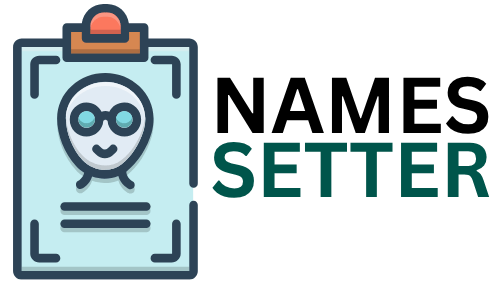
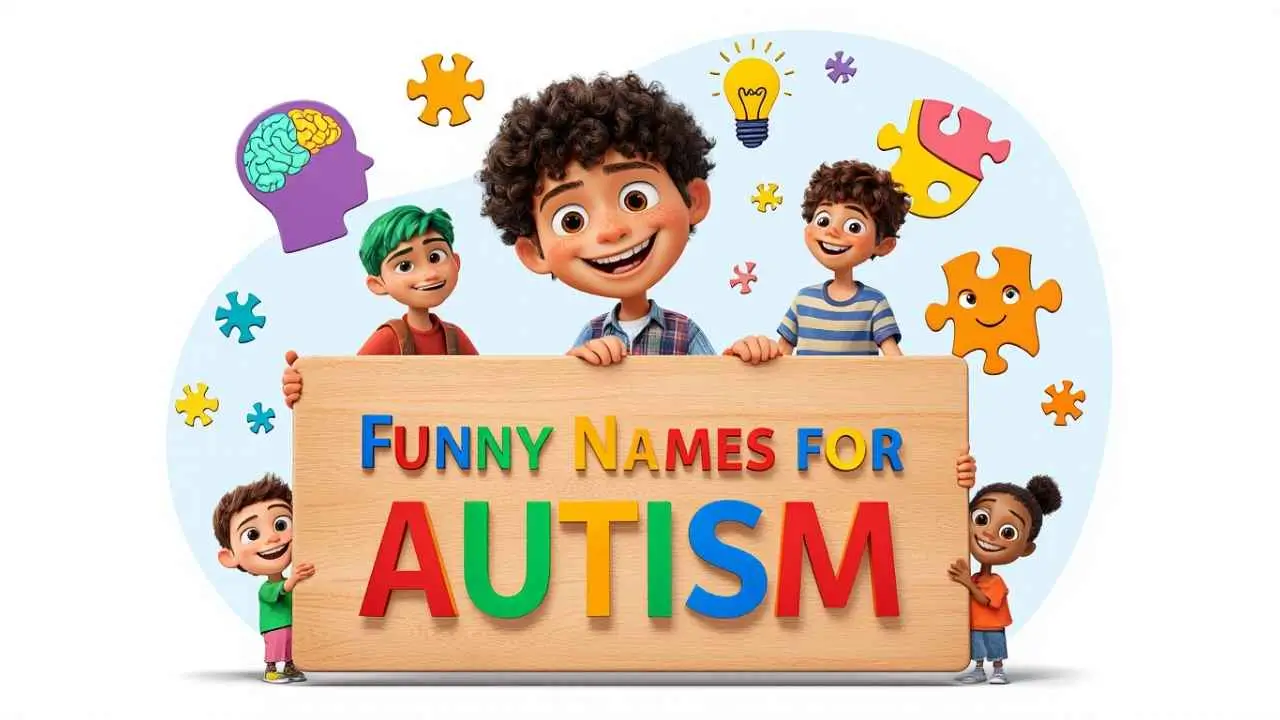


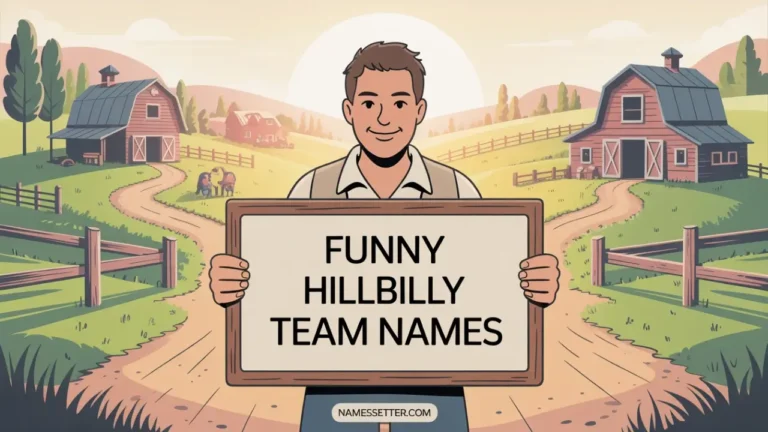
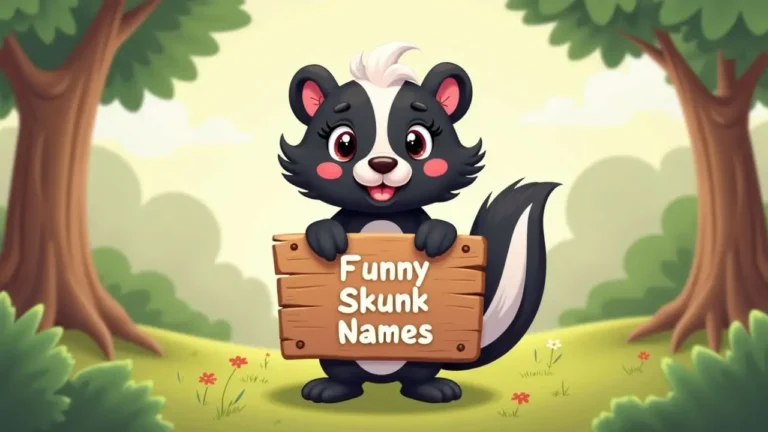
[…] 200+ Funny Names For Autism […]